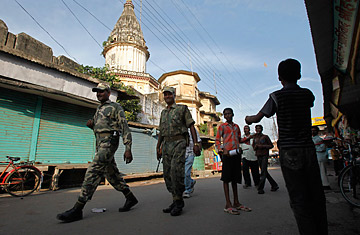
Paramilitary soldiers patrol a road in the northern Indian town of Ayodhya.
On Wednesday evening a handful of Muslim and Hindu women gathered in a small room in a village called Kondli near Delhi. The room hummed with the murmur of prayer and the click of beads. The women, under the guidance of Tehmina Khan, the wife of a local Muslim cleric, had assembled since last week to chant a peace prayer 11,000 times. The object of the prayer was of grave seriousness: the sometimes murderous, religious dispute surrounding a mosque and a temple in a small town called Ayodhya, hundreds of miles away in the state of Uttar Pradesh.
Ayodhya has been the locus of intermittent Hindu versus Muslim violence for centuries — centered on the Babri mosque, which was built in the early 16th century after the area was conquered by Babur, the founding father of the Muslim Mughal dynasty. Hindus claim that it was erected after Babur's men destroyed a temple that marked the place where the god Ram was born. But in the late 1980s, the dispute over the mosque spiraled out of control when nationalist political parties like the Bharatiya Janata Party (BJP) and right-wing Hindu groups tried to gain political mileage by exacerbating communal divisions. In December 1992, tens of thousands of Hindu fundamentalists descended on the Babri Mosque and demolished it; as a consequence, sectarian rioting broke out and spread throughout India, resulting in the deaths of more than 2,000 people. The violence was worse in Maharashtra state and its largest city Mumbai, where Hindu right-wing groups like the Shiv Sena and the Rashtriya Swayam Sevak Sangh (RSS) are most active.
The years since have been filled with tension and sectarian debate between India's majority Hindus and minority Muslims (who nevertheless number more than 100 million). Meanwhile, Indians waited anxiously for a decision in a 60-year long court case that sought to determine who really owned the disputed property where the mosque stood. On Wednesday night, Tehmina explained that her interfaith group was praying that the verdict would somehow be in favor of everyone and that everyone would accept it as God's will and continue to live in peace.
Their prayers appeared to have been answered — even though answered prayers may not be perfect or even permanent solutions. On Thursday afternoon, in Uttar Pradesh, the Allahabad High Court issued a Solomonic decision: it ruled that the disputed land would be divided between Hindu and Muslim groups. A mosque and a temple would be built side by side within three months. All three parties in the lawsuit — Muslims, Hindus and the Hindu sect Nirmohi Akhara — were declared joint holders of the property in dispute, Justice S.U. Khan said in a ruling that was posted on court's website. (Nirmohi Akhara, an ascetic Hindu denomination, received its share because it happened to have the longest surviving legal bid to the property in the 60-year lawsuit.)
The court tried to come right down the middle, ceding arguments to both religions. The verdict upheld the Hindu argument that the main area of the mosque was the birthplace of Ram but negated the assertion that the mosque was built after the demolition of a Hindu temple during the Mughal period. The mosque, the verdict said based on an excavation report, was built on what were already the ruins of an ancient Hindu temple.
But will such an attempt at even-handedness work? In Mumbai, where 900 people died in the 1992 riots, Barhanuddin Qasimi, 36, a Muslim resident said, "even if the mosque is built beside the temple, Muslims should not pray in it. I have my doubts whether in practical terms a mosque and a temple can coexist." Meanwhile, the Hindus and the Muslims aren't giving up their battle for full rather than shared ownership, gearing up to appeal the verdict in a higher court. Says Ram Madhav, spokesperson of the RSS: "We will stick to our demand of building a magnificent Ram temple." Zafaryab Jilani, the lawyer for the Muslim groups meanwhile argued that winning was important not only for his co-religionists but for the country. "Our victory will mean a victory of secularism in India."
"The sentiments have not changed," says Pratap Mehta, president of the think tank Centre for Policy Research in New Delhi; "it just is not in the interest of any party at the moment to invoke the communal card." Indeed, the RSS's Madhav told TIME that "maintaining calm and peace is the responsibility of the entire civil society. We will ensure that none of our cadres will do anything to incite violence. We have sent instructions to that effect to all our volunteers." After the verdict the RSS released a statement urging people not to view the verdict as a victory or loss for any group.
The Indian government seemed confident there would be no trouble. Home Minister P. Chidambaram said that India had moved on from the events of 1992 and that the younger generation has a different worldview. But the confidence may have been buoyed by security measures taken in the walk-up to the verdict. In Noida, the largest city in Uttar Pradesh, there was an unofficial curfew on the streets on Thursday afternoon, with shops being asked to remain closed by policemen who also advised people not to gather around in crowds of more than five people. More than 190,000 police personnel were deployed across the state. In Mumbai, 48,000 policemen were deployed and 8,000 people taken into custody as a precaution.
